 Bushwhackers
Bushwhackers
THE CIVIL WAR ERA IN THE SOUTH
Brian Craig Miller and LeeAnn Whites, Series Editors
Bushwhackers: Guerrilla Warfare, Manhood,
and the Household in Civil War Missouri
Joseph M. Beilein Jr.
 Bushwhackers
Bushwhackers
Guerrilla Warfare, Manhood,
and the Household in
Civil War Missouri
JOSEPH M. BEILEIN JR.
The Kent State University Press
Kent, Ohio
2016 by The Kent State University Press, Kent, Ohio 44242
All rights reserved
Library of Congress Catalog Number 2015036092
ISBN 978-1-60635-270-0
Manufactured in the United States of America
Search And Destroy
Written by Iggy Pop and James Williamson
Copyright 1973 BMG Bumblebee, Strait James Music and EMI Music Publishing Ltd.
Copyright Renewed
All Rights for BMG Bumblebee and Strait James Music Administered by
BMG Rights Management (US) LLC
All Rights for EMI Music Publishing Ltd. Administered by Sony/ATV Music Publishing
LLC, 424 Church Street, Suite 1200, Nashville, TN 37219
All Rights Reserved Used by Permission
Reprinted by Permission of Hal Leonard Corporation
Library of Congress Cataloging-in-Publication Data
Beilein, Joseph M., Jr., author.
Bushwhackers : guerrilla warfare, manhood, and the household in Civil War Missouri /
Joseph M. Beilein Jr.
pages cm. (The Civil War era in the South)
Includes bibliographical references and index.
ISBN 978-1-60635-270-0 (alk. paper)
1. MissouriHistoryCivil War, 18611865Underground movements. 2. MissouriHistoryCivil War, 18611865Commando operations. 3. Guerrilla warfareMissouriHistory19th century. 4. GuerrillasMissouriHistory19th century. 5. MissouriHistoryCivil War, 18611865Campaigns.
I. Title.
E470.45.B45 2016
977.803dc23
2015036092
20 19 18 17 16 5 4 3 2 1
For my kin:
the Gums, Nilands, Rules, and Beileins,
past, present, and future.
Im a street walkin cheetah with a heart full of napalm
Im a runaway son of the nuclear A-bomb
I am the worlds forgotten boy
The one who searches and destroys
Honey gotta help me please
Somebodys gotta save my soul
Baby detonate for me
Look out honey, cause Im using technology
Aint got time to make no apology
Soul radiation in the dead of night
Love in the middle of a firefight
Honey gotta strike me blind
Somebody gotta save my soul
Baby penetrate my mind
And Im the worlds forgotten boy
The one whos searchin, searchin to destroy
And honey Im the worlds forgotten boy
The one whos searchin, searchin to destroy
Iggy Pop and James Williamson
Search and Destroy (1973)
Contents
IT IS WITH MIXED EMOTIONS that I present to you Bushwhackers. It is a book that has given me joy and purpose and has sparked a great amount of self-discovery and growth. As it leaves my hands and enters yours, I am confronted with that anxious feeling that always accompanies the irresistible onrushing of the unknown. What will I do now? Can my next project give me as much as this study? Will I ever be able to fully emerge from the universe of the guerrilla and enter another historical world? Despite these questions that remain unanswered for the moment, it is with a deep sense of pride that I offer you this book, without apology, caveat, or qualification. I have striven to put onto the pages that follow the most intimate historical rendering of the guerrillas who fought in Civil War Missouri. In my pursuit of their identity as men, I was forced to become much more aware of myself. Along the way there were fights with a wide range of adversaries both real and metaphorical; there were victories and defeats, I lost pieces of myself, but in sacrificing a little bit I have gained much more. Most important, in the spirit of the guerrillas, I lived to fight another day and was able to produce something that will live on and keep up the fight long after I am gone.
THERE WERE A GREAT MANY INSTITUTIONS and individuals who came to my aid in the production of this book. This project, which can be traced back to my masters thesis and dissertation, could not have been possible if not for the various forms of financial support that I received from the Department of History at the University of Missouri. The James S. Rollins Slavery Atonement Endowment for Black Studies at the University of Missouri also provided support during this process. Additionally, the Filson Historical Society gave me a helpful research grant. The Southern Roundtable at the University of Georgia gave me a great opportunity to share my work, and I thank them for the opportunity to receive feedback from a wonderful set of young scholars and to make a great many new friends. Penn State Behrend has been very supportive in a number of different ways to help facilitate the research and completion of Bushwhackers. Finally, I would like to thank the dozens of archivists, curators, and librarians and all of the various institutions who helped me to track down so much of the material that appears in this book.
It is impossible to name all of the people who assisted or otherwise influenced the creation of this book. The list of teachers and comrades and colleagues is probably too long for me to mention everyone, but I will try. My first interest in Missouris guerrilla conflict came during my undergraduate days at Kenyon College where Will Scott did his best to guide me through the complexities of the war on the other side of the river, as he called it. His biggest challenge was not so much explaining the war but rather who he was trying to explain it to (a rather distracted student with a passion for a number of extracurricular activities). Bruce Kinzer and Roy Wortman were also of great influence upon my work, but no one knew it at the time. In my graduate studies, the list of professors who taught me at the University of Missouri is a long one: Mark Carroll, Wilma King, Mary Jo Neitz, Jeff Pasley, Linda Reeder, Robert Smail, Robert Weems, John Wigger, and Laurel Wilson. I have also been very lucky to have a wide range of Civil War scholars read, comment, or otherwise shape all or pieces of this book. They are Paul Anderson, Steve Berry, Jim Broomall, Diane Mutti Burke, Vikki Bynum, Zach Garrison, Lesley Gordon, James Huston, Brian Miller, Barton Myers, Megan Kate Nelson, Ken Noe, Chris Phillips, Bill Piston, Aaron Sheehan-Dean, and Matt Stanley.
Comradery was critically important to the completion of this project. There were my friends from Mizzou who sat around the same seminar table with me, read pieces of this book, but more important were supportive both in and out of the classroom. The cast of characters from the basement of Read Hall includes but is not limited to Megan Boccardi, Dave Brock, Daniel Conner, Jonathan Dee Jones, Vernon Mitchell, Will Mountz, Josh Nudell, Jonathan Root, Leroy Rowe, Mike Snodgrass, T.J. Tomlin, Lucas Volkman, and Andrea Weingartner. My colleagues here at Penn State Behrend have also provided wonderful friendship during the final phases of writing the book, and I couldnt ask for better colleagues in the history program: Dick Aquila, Leigh-Ann Bedal, Amy Carney, Glenn Kumhera, and John Rossi. Also, Ive formed relationships with many of my fellow professors in the School of Humanities and Social Sciences who have helped to foster a positive work environment. This list includes but is not limited to Joe Bookman, Teri Caruso, Eric Corty, Sharon Dale, Elizabeth Fogle, John Gamble, Steve Hicks, Jill Kambs, Matt Levy, Janet Neigh, Tom Noyes, Dan Shank, Joshua Shaw, and Craig Warren. Of special note is Matt Lesnett, a student of mine and my research assistant. His labor was incredibly valuable to me, but more than that, his observations and questions helped me to see the work in new ways. Thank you all!


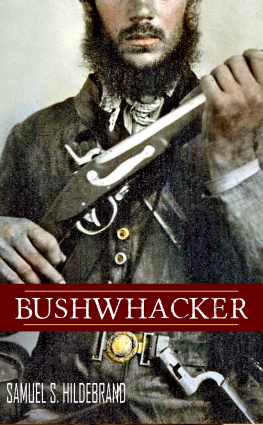
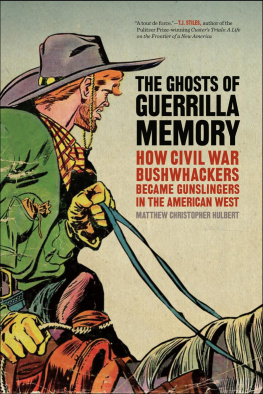
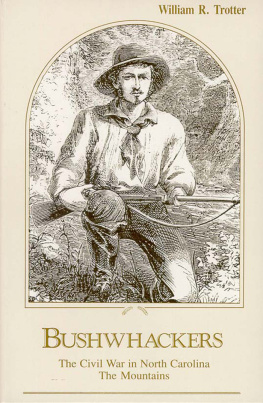
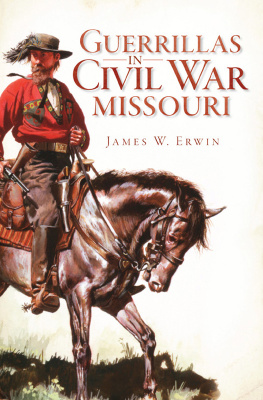
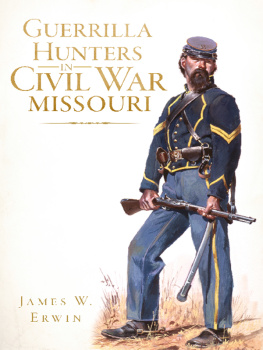


 Bushwhackers
Bushwhackers
 Bushwhackers
Bushwhackers
